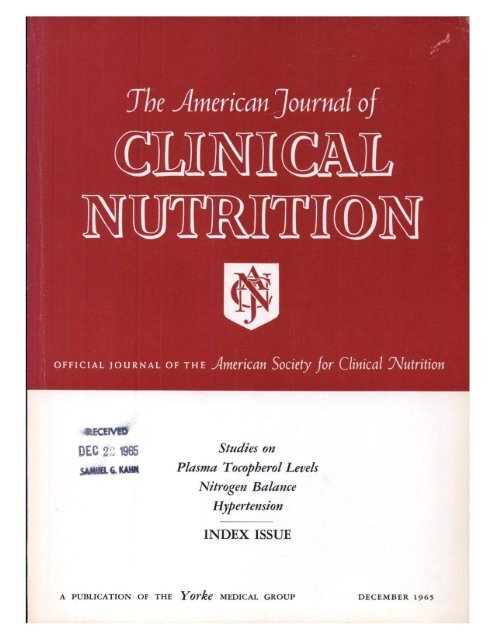2018年世界癌症研究基金会/美国癌症研究所癌症研究评分和癌症风险:来自糖尿病预防项目结果研究的结果。
IF 6.9
1区 医学
Q1 NUTRITION & DIETETICS
引用次数: 0
摘要
背景:改变生活方式因素可以降低肥胖、糖尿病和癌症的发病率。目的:在糖尿病预防项目(DPP, 1996-2001)和DPP结局研究(DPPOS, 2002-2020)中,我们研究了使用2018年WCRF/AICR评分的2018年世界癌症研究基金会/美国癌症研究所(WCRF/AICR)癌症预防建议与糖尿病前期成人生活方式相关癌症的发生率之间的关系,这是一项随机临床试验的观察性随访。方法:参与者被随机分配到生活方式、二甲双胍或安慰剂干预组(平均3年),并随访19年。2018年WCRF/AICR评分(0-7分;在随机化后的0、1、5、6、9和15y,根据体重、体力活动、饮食和酒精成分计算得分越高,一致性越好)。癌症发生率基于2018年WCRF/AICR第三次专家报告(18种与生活方式相关的癌症)。调整后的Cox比例风险模型估计了评分(基线[0],从0-1y变化,时间依赖)与生活方式相关癌症之间的关联。结果:受试者(N=3000)基线WCRF/AICR评分平均为3.2 (SD=1.1)。有403宗与生活方式有关的癌症个案。结论:与WCRF/AICR建议一致可能降低成人前驱糖尿病和2型糖尿病患者的癌症风险,强调了考虑生活方式因素对癌症预防的重要性。试验注册号:糖尿病预防项目,NCT00004992;糖尿病预防项目结果研究,NCT00038727 DPP研究注册页面:https://clinicaltrials.gov/study/NCT00004992 DPPOS研究注册页面:https://clinicaltrials.gov/study/NCT00038727。本文章由计算机程序翻译,如有差异,请以英文原文为准。
The 2018 World Cancer Research Fund/American Institute for Cancer Research Score and Cancer Risk: results from the diabetes prevention program outcomes study
Background
Modifying lifestyle factors may reduce the incidence of obesity, diabetes, and cancer.
Objectives
We examined how alignment with the 2018 World Cancer Research Fund/American Institute for Cancer Research (WCRF/AICR) Cancer Prevention Recommendations using the 2018 WCRF/AICR score was associated with incident lifestyle-related cancer in adults with prediabetes in the Diabetes Prevention Program (DPP, 1996–2001) and DPP Outcomes Study (DPPOS, 2002–2020), an observational follow-up of a randomized clinical trial.
Methods
Participants were randomly assigned to lifestyle, metformin, or placebo interventions (mean: 3 y) and followed for an additional 19 y. The 2018 WCRF/AICR score (0–7 points; higher score, better alignment) was calculated from body weight, physical activity, diet, and alcohol components at 0, 1, 5, 6, 9, and 15 y after randomization. Incident cancer was based on the 2018 WCRF/AICR 3rd Expert Report (18 cancers associated with lifestyle). Adjusted Cox proportional hazard models estimated associations between the score (baseline [0], change from 0 to 1 y, time dependent) and lifestyle-related cancer.
Results
Participants’ (N = 3000) mean baseline WCRF/AICR score was 3.2 (SD: 1.1). There were 403 incident lifestyle-related cancer cases. Scores improved after 1 and 15 y (mean increase = 0.43 and 0.27 points, respectively, both P < 0.001). The baseline score was not associated with cancer risk. However, a 1-unit score improvement from 0 to 1 y and time-dependent scores were significantly associated with a 14% (hazard ratio [HR]: 0.86; 95% confidence interval [95% CI]: 0.76, 0.97) and 9% (HR: 0.91; 95% CI: 0.83, 0.997) lower risk, respectively, with no effect modification by intervention group or diabetes status. In exploratory by-component analyses, no single component was associated with risk.
Conclusions
Alignment with WCRF/AICR recommendations may lower cancer risk in adults with prediabetes and type 2 diabetes, highlighting the importance of considering lifestyle factors for cancer prevention.
Trial registration number
Diabetes Prevention Program, NCT00004992; Diabetes Prevention Program Outcomes Study, NCT00038727.
求助全文
通过发布文献求助,成功后即可免费获取论文全文。
去求助
来源期刊
CiteScore
12.40
自引率
4.20%
发文量
332
审稿时长
38 days
期刊介绍:
American Journal of Clinical Nutrition is recognized as the most highly rated peer-reviewed, primary research journal in nutrition and dietetics.It focuses on publishing the latest research on various topics in nutrition, including but not limited to obesity, vitamins and minerals, nutrition and disease, and energy metabolism.
Purpose:
The purpose of AJCN is to:
Publish original research studies relevant to human and clinical nutrition.
Consider well-controlled clinical studies describing scientific mechanisms, efficacy, and safety of dietary interventions in the context of disease prevention or health benefits.
Encourage public health and epidemiologic studies relevant to human nutrition.
Promote innovative investigations of nutritional questions employing epigenetic, genomic, proteomic, and metabolomic approaches.
Include solicited editorials, book reviews, solicited or unsolicited review articles, invited controversy position papers, and letters to the Editor related to prior AJCN articles.
Peer Review Process:
All submitted material with scientific content undergoes peer review by the Editors or their designees before acceptance for publication.

 求助内容:
求助内容: 应助结果提醒方式:
应助结果提醒方式:


